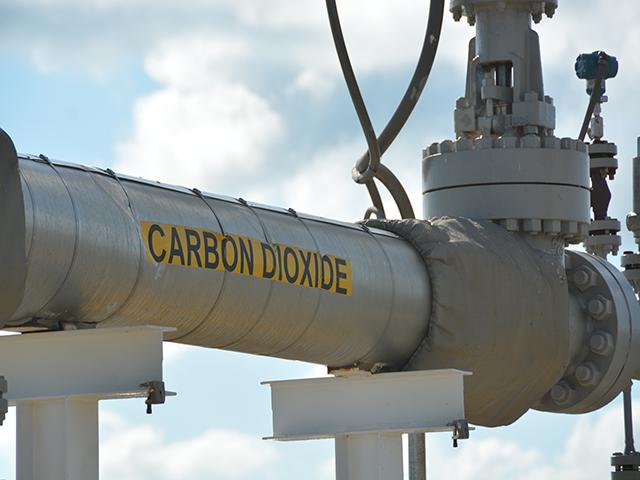SD Bills Clear Way for Carbon Pipeline
SD Legislature Passes Bills to Protect Landowners, Carbon Pipeline Companies
LINCOLN, Neb. (DTN) -- The South Dakota Legislature on Wednesday passed a trio of bills designed to clear the way for the Summit Carbon Solutions proposed carbon pipeline while protecting landowners.
Summit continues to jump through regulatory hoops in South Dakota, North Dakota, Iowa, Minnesota and Nebraska before launching construction on a 1,250-mile pipeline connecting to 57 ethanol plants across the Midwest.
Earlier this week Summit announced the addition of eight of Valero's 12 ethanol plants to the project that appears to be gaining momentum.
Summit continues to seek regulatory approval from the South Dakota Public Utilities Commission, as the company already has acquired 75% of the land needed to build in the state.
Under the bills carbon pipeline operators would be required to pay a $500 access fee to survey land and counties could collect a surcharge of up to $1 for every linear foot of pipeline constructed.
The bills would hold pipeline companies liable for damages caused by construction and would require company plans to bury pipelines at least four feet deep.
In addition, the measures restrict the time easements are in effect to five years if companies are unable to acquire state permits or the easements are not used.
Landowners also would have the right to land survey results and have the ability to stop and contest surveys as long as they go to court within 30 days of notice.
P[L1] D[0x0] M[300x250] OOP[F] ADUNIT[] T[]
"Summit Carbon Solutions is thankful for the passage of a series of bills, 'the landowner bill of rights,' that will provide significant landowner protections while ensuring regulatory certainty and promoting the future of the ethanol industry in South Dakota," Summit said in a statement on Wednesday.
"We appreciate the attention and engagement from so many South Dakotans, especially our partners and agricultural leaders. We look forward to doing our part to create and maintain successful relationships going forward. As South Dakota Ethanol Producers said, this legislation is unequivocally pro-landowner, pro-business, pro-farmer and pro-ethanol."
The South Dakota Farmers Union is on record opposing the bills.
SDFU lobbyist Mitch Richter told DTN the organization has concerns that the measures don't adequately address the use of eminent domain in pipeline projects.
"South Dakota Farmers Union is disappointed that the South Dakota Legislature failed to address the use of eminent domain for private gain allowing private for-profit companies to trample landowner rights in the name of private shareholder gain," Richter said in a statement.
"The legislature did provide some certainty of service, one-time payment for access, some easement limitations and authorization of court challenges. Senate Bill 201 provides some minimum standards for safety, clarifies the role of the Public Utilities Commission and provides for a county surcharge. South Dakota Farmers Union believes that this opens the door for other industries to use these new laws to further disregard the rights of fourth- and fifth-generation farmers in South Dakota. We urge the legislature to provide a different pathway for eminent domain for private gain."
Monte Shaw, Iowa Renewable Fuels Association executive director, said in a statement the regulatory path is clearing for the project.
"It is our view that with a workable path forward in South Dakota and the regulatory process well on its way in Iowa and North Dakota, we can now see light at the end of the tunnel," Shaw said in a statement.
"Carbon capture and sequestration cuts Iowa ethanol's carbon score by more than half. It singlehandedly opens up a massive new 35-billion-gallon sustainable aviation fuel market for Iowa corn farmers. Creating new demand at a time when corn supplies have swelled over 2.2 billion bushels and corn prices have dropped over two bucks isn't just important for the next two or three years. Opening up the SAF market can literally power Iowa's rural economy for the next two to three decades."
American Carbon Alliance CEO Tom Buis said the bills were an important step for agriculture.
"Creating an economic environment in the state to allow carbon capture and sequestration projects such as the Summit Pipeline is essential in creating new demand for corn," Buis said in a statement.
"Capturing carbon at ethanol plants and piping it to areas where it can be permanently stored will result in ethanol qualifying as a low-carbon fuel -- a requirement for next-generation fuels at the pump and sustainable aviation fuels. The potential economic impact for South Dakota farmers, the ethanol industry, rural communities and the agriculture industry as a whole, is something that rarely comes along."
Walt Wendland, president of the South Dakota Ethanol Producers Association board, said in a statement the bills are "pro-landowner, pro-business, pro-farmer and pro-ethanol."
Summit said it plans to begin construction on the pipeline in early 2025 with operations launching in 2026.
Read more on DTN:
"Summit CEO: CO2 Pipeline's Time is Now," https://www.dtnpf.com/…
Todd Neeley can be reached at todd.neeley@dtn.com
Follow him on X, formerly known as Twitter, @DTNeeley
(c) Copyright 2024 DTN, LLC. All rights reserved.




